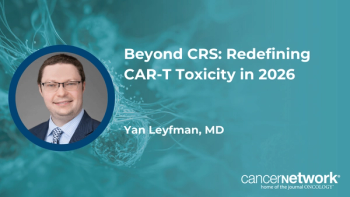
- ONCOLOGY Vol 27 No 8
- Volume 27
- Issue 8
Announcing a New Series: Understanding Unusual Dysproteinemias
In a new series, beginning this month and running into early 2014, experts on five “unusual dysproteinemias” will share their insights into diagnosis and management.
Oncologists and hematologists regularly see patients with illnesses associated with production of an abnormal protein. For example, multiple myeloma presenting with overproduction of IgG, IgA, or either kappa or lambda light chains is an entity well known to anyone who cares for patients with hematologic malignancies. Similarly, Waldenstrm macroglobulinemia, associated with overproduction of IgM, although less common, is a clearly defined and well-recognized entity. Increasingly, both diseases can be effectively treated using a variety of new agents, such as bortezomib, lenalidomide, and bendamustine-to name a few.
However, there are a number of other disorders of the immune system involving abnormal protein production that are much less well known. These are uncommon diseases that individual oncologists/hematologists will rarely see . Because the diagnosis is often not straightforward, yet useful treatments for affected patients do exist, a review of these entities will be useful to many.
In a new series, beginning this month and running into early 2014, experts on five of these “unusual dysproteinemias” will share their insights into diagnosis and management.
In the first article in this series, which begins on page 798 of the current issue, Dr. Robert Kyle of the Mayo Clinic in Rochester, Minnesota discusses multiple myeloma variants in which the tumor cells secrete IgD or IgE. IgD myeloma has some unusual clinical features, and can pose a diagnostic dilemma. IgE myeloma is an extraordinarily rare entity.
Dr. Sagar Lonial of Emory University in Atlanta will discuss unusual patients with myeloma who do not secrete either an intact immunoglobulin or excessive amounts of light chains. These malignancies, often called nonsecretory myeloma, can give rise to diagnostic and therapeutic dilemmas. Assessing the response to therapy can be particularly difficult.
Three other unusual dysproteniemias will be discussed in the series. Dr. Kenneth Anderson of the Dana-Farber Institute in Boston will present the diagnostic and therapeutic challenges associated with a group of illnesses called heavy-chain disease. Dr. Manuel Ramos-Casals of Barcelona, Spain will discuss the often confusing cryoglobulinemias. Finally, Dr. Angela Dispenzieri of the Mayo Clinic in Rochester will discuss the diagnosis and management of POEMS syndrome-a sometimes confusing entity that is regularly associated with abnormal protein production.
For many practicing oncologists/hematologists, the journal ONCOLOGY has played an important role in their ongoing education. Especially for diseases that are seen only rarely, ONCOLOGY’s reviews have proved a useful aid in patient care, as they can both be read on initial publication and also torn out and filed for future reference. The articles from this series, written by experts in the care of patients with these unusual dysproteniemias, will further that tradition.
Articles in this issue
Newsletter
Stay up to date on recent advances in the multidisciplinary approach to cancer.













































